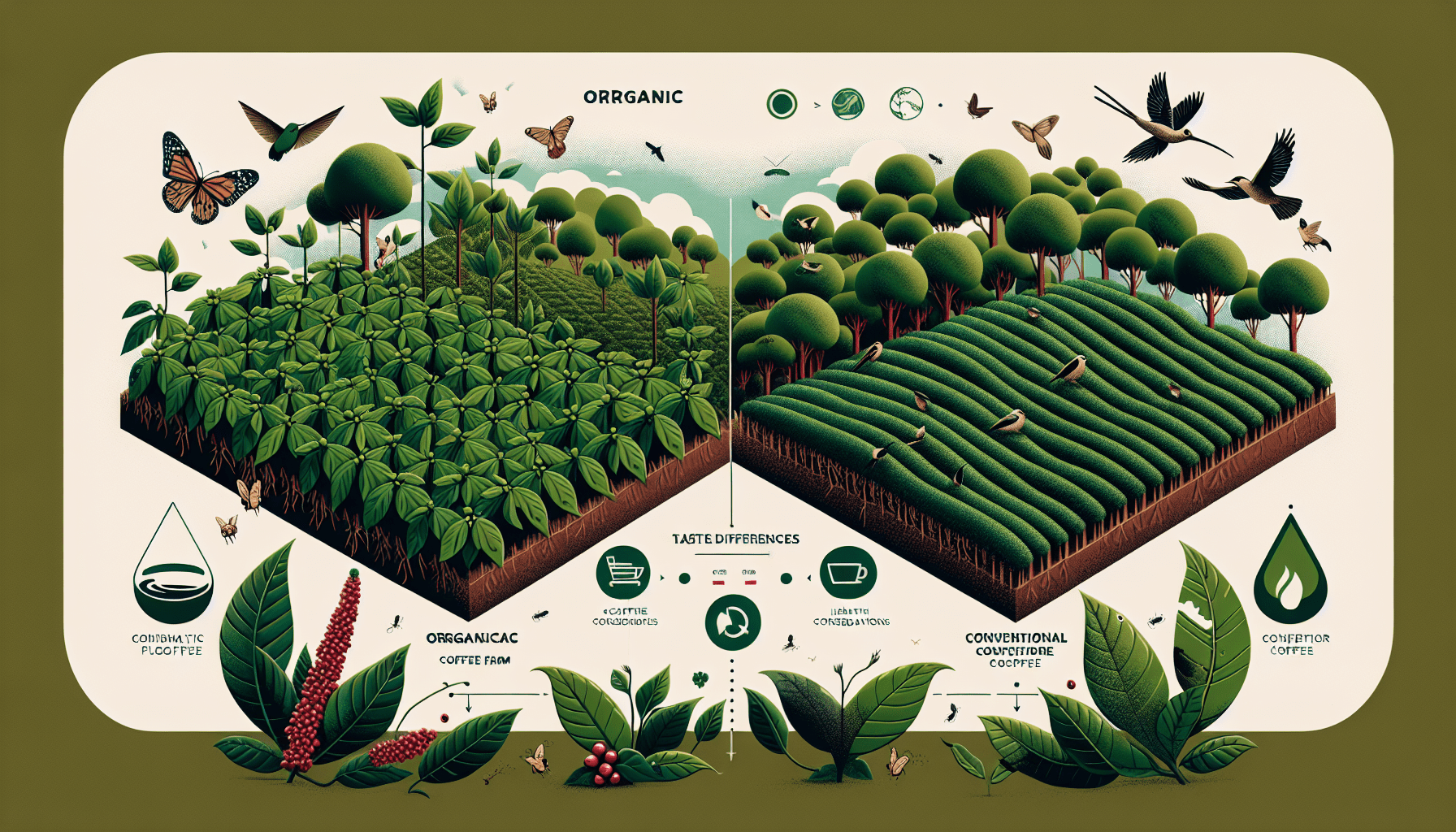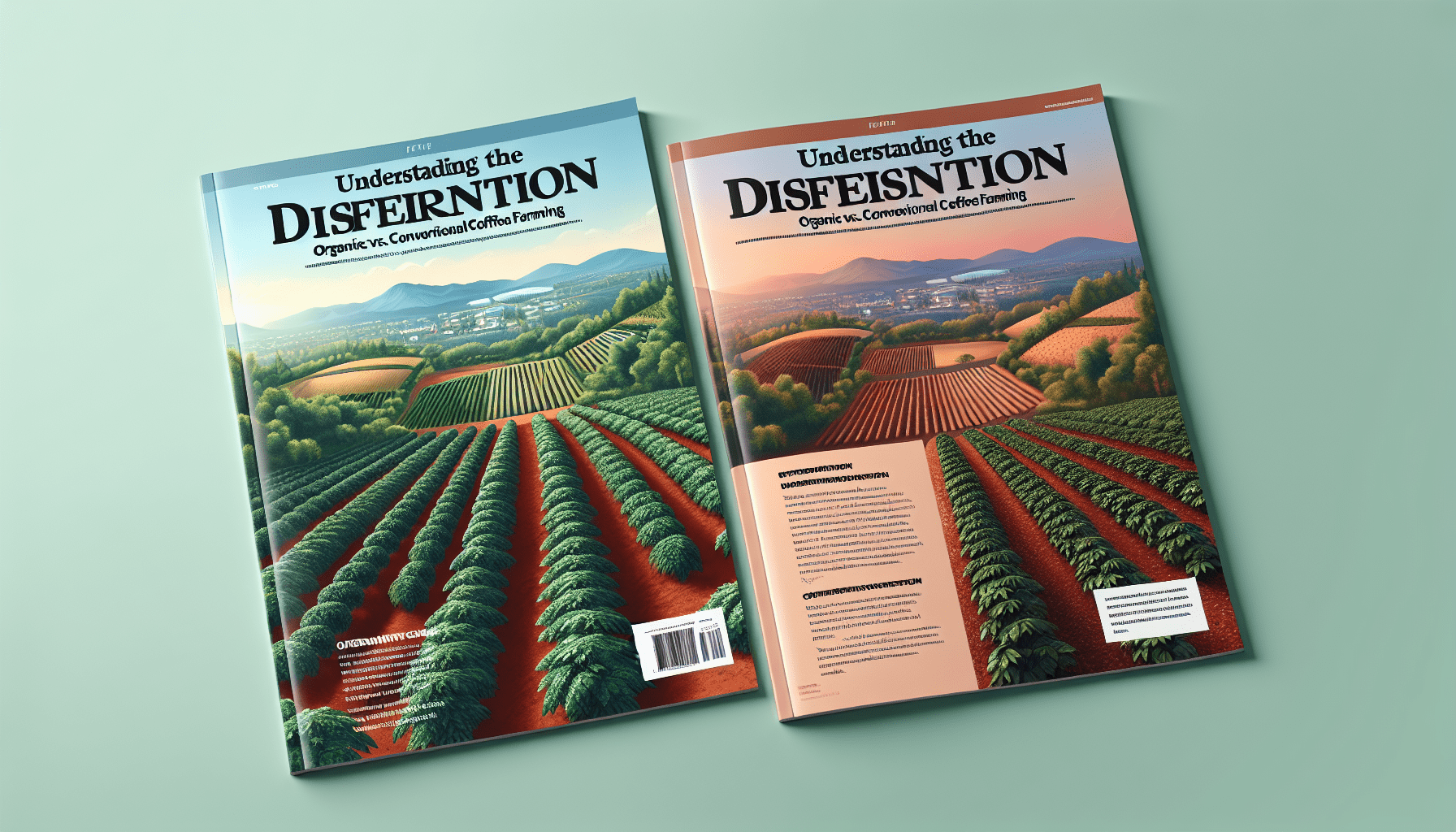Today, we’re exploring the wonderful world of coffee farming and uncovering the key differences between organic and conventional practices. From the methods used to the impact on the environment and our health, understanding these distinctions can help us make more informed choices when sipping our morning brew. So grab a cup of joe and join us as we navigate through the intricate world of coffee cultivation!
Environmental Impact
Pesticide use in conventional coffee farming
In conventional coffee farming, pesticides are commonly used to control pests and diseases that can damage the coffee plants. These chemicals, such as synthetic insecticides and fungicides, are often sprayed onto the coffee crops to protect them from infestations and ensure higher yields. However, excessive pesticide use can have detrimental effects on the environment.
Effects of pesticides on the environment
The use of pesticides in conventional coffee farming can lead to environmental pollution and negative impacts on ecosystems. When these chemicals are sprayed, they can contaminate the air, water, and soil. Pesticide runoff can find its way into nearby water sources, causing water pollution and endangering aquatic life.
Furthermore, pesticides can harm beneficial insects, birds, and other wildlife that are essential for maintaining a balanced ecosystem. They can disrupt the natural food chain and lead to a decline in biodiversity. Pesticides can also have long-term effects on soil health, degrading its quality and reducing its ability to support plant growth.
Benefits of organic coffee farming for the environment
Organic coffee farming, on the other hand, avoids the use of synthetic pesticides and instead relies on natural methods for pest control. This approach has several environmental benefits. By avoiding the use of chemical pesticides, organic coffee farming helps minimize environmental pollution and reduces the risk of harm to wildlife and ecosystems.
Organic farming practices also prioritize soil health and promote the conservation of biodiversity. Organic coffee farmers utilize techniques such as composting, crop rotation, and the use of natural fertilizers to maintain the fertility of the soil and promote beneficial microorganisms. This not only preserves the health of the soil but also contributes to the overall resilience and sustainability of the ecosystem.
Health Considerations
Residue of pesticides in conventional coffee beans
One of the key concerns regarding conventional coffee farming is the presence of pesticide residues in the coffee beans. Pesticides used in conventional farming can leave trace amounts on the coffee crops, which can then end up in the final product consumed by consumers. Continuous exposure to these residues may pose health risks.
Potential health risks of consuming pesticides
Consuming pesticides through coffee consumption has been associated with potential health risks. Some studies have linked pesticide exposure to various health issues, including neurological disorders, hormonal imbalances, and even certain types of cancers. While the concentrations of pesticides in coffee beans are usually low, the cumulative effects of long-term exposure have raised concerns among health experts.
Organic coffee and its health benefits
Organic coffee offers a healthier alternative as it is produced without the use of synthetic pesticides. Choosing organic coffee reduces the risk of pesticide exposure and potential health hazards associated with conventional coffee consumption. Additionally, organic coffee is often grown using sustainable practices, which may lead to higher nutrient content and antioxidant levels, providing potential health benefits to consumers.
Quality and Taste
Factors affecting taste in conventional coffee farming
In conventional coffee farming, the use of synthetic chemicals, along with intensive practices, can impact the taste and quality of the final product. Pesticides and synthetic fertilizers may alter the natural flavors and aromas of coffee, resulting in a less nuanced and unique taste profile. Additionally, the monoculture nature of conventional farming can lead to a loss of biodiversity, potentially contributing to a less flavorful coffee bean.
Quality standards in organic coffee farming
Organic coffee farming places a strong emphasis on maintaining high-quality standards. Organic coffee is often grown using traditional and sustainable methods, allowing the coffee plants to develop in harmony with the surrounding environment. The use of organic fertilizers and the preservation of biodiversity can contribute to the development of unique flavors and a higher-quality coffee bean.
Distinct flavors of organic coffee
Organic coffee is known for its distinct flavors and nuances. The preservation of biodiversity in organic coffee farming allows for a wider range of plant species to coexist, leading to a more diverse and complex flavor profile. Organic coffee often exhibits flavors that are more vibrant, fruity, and nuanced, enhancing the overall coffee-drinking experience for enthusiasts who appreciate the taste intricacies of each cup.
Price and Accessibility
Factors influencing the price of organic coffee
The price of organic coffee is influenced by several factors. Firstly, organic farming practices tend to be more labor-intensive and require additional resources compared to conventional farming methods, which can contribute to higher production costs. Secondly, organic certification processes and compliance with organic standards incur additional expenses for farmers. Finally, the supply and demand dynamics of organic coffee can also impact its price, as limited availability may result in higher market prices.
Availability of organic coffee worldwide
Over the past years, the demand for organic coffee has experienced significant growth, leading to an increase in its availability worldwide. Many coffee-producing regions have embraced organic farming practices to cater to this growing market. Nonetheless, organic coffee is still relatively more limited in terms of global production compared to conventional coffee.
Comparison of prices between organic and conventional coffee
Due to the factors influencing its production costs, organic coffee is generally priced higher than conventional coffee. The price difference can vary depending on factors such as location, market demand, and the specific certification standards. While the initial cost may be slightly higher for consumers, many perceive the value of organic coffee in terms of its environmental and health benefits, thus justifying the price differential.

Certifications and Regulations
Certification processes for organic coffee
Organic coffee certification is managed by various organizations worldwide, providing guidelines and standards that ensure organic farming practices are followed. Organic coffee farmers are required to implement specific practices, such as avoiding synthetic pesticides and fertilizers, maintaining soil health, and promoting biodiversity. Certification processes involve regular inspections and verification to ensure compliance with the organic standards.
Standards and regulations for conventional coffee farming
Conventional coffee farming is subject to regulations regarding the use of pesticides and fertilizers. However, the specific regulations may vary among different countries and regions. These regulations often focus on setting maximum residue limits for pesticides to minimize potential risks to consumers. Nonetheless, the extensive use of synthetic chemicals in conventional coffee farming raises concerns about the long-term sustainability and environmental impact of these practices.
Consumer awareness and labels
Consumer awareness regarding organic and conventional coffee farming has grown significantly in recent years. Labels and certifications play a crucial role in communicating the farming methods used to produce the coffee. Recognized organic certifications, such as USDA Organic, EU Organic, and JAS Organic, provide consumers with assurance that the coffee has met specific organic standards. Such labels enable consumers to make informed choices and support sustainable and environmentally friendly practices.
Sustainability and Fair Trade
Sustainable practices in organic coffee farming
Organic coffee farming embraces sustainable practices that focus on long-term ecological balance. By avoiding the use of synthetic chemicals, organic farmers contribute to the preservation of soil quality, biodiversity, and overall ecosystem health. Sustainable practices such as agroforestry, shade-grown cultivation, and water conservation techniques help minimize environmental impact and support the viability of coffee farming in the long run.
Fair trade principles and their application in the coffee industry
Fair trade principles aim to create equitable and sustainable trading conditions for coffee producers. Fair trade certification ensures that farmers receive fair prices for their products, allowing them to invest in their farms, communities, and workers. Fair trade practices also promote social and environmental responsibility, focusing on improving the livelihoods of coffee farmers and fostering sustainable development within coffee-producing regions.
Impact of conventional farming on local communities
Conventional coffee farming practices can have significant implications for local communities. The extensive use of pesticides in conventional farming may impact the health and well-being of farmers, workers, and nearby communities. Furthermore, the economic inequalities and price volatility in the conventional coffee industry can make it challenging for farmers to achieve a sustainable and stable income, with potential consequences for community development and the overall quality of life.

Crop Yield and Efficiency
Comparing crop yields of organic and conventional coffee farming
In terms of crop yield, conventional coffee farming often outperforms organic farming due to the use of synthetic inputs and intensive agricultural practices. Synthetic pesticides and fertilizers can help control pests and optimize plant growth, leading to higher yields in the short term. However, long-term yield comparisons become more complex due to the potential negative impacts of conventional farming on soil health and ecosystem resilience.
Methods to increase efficiency in organic coffee production
Organic coffee farmers employ various techniques to increase efficiency in their production. These include maintaining healthy soil through organic fertilization, employing companion planting strategies to control pests, and utilizing shade-grown cultivation to optimize environmental conditions for coffee growth. Additionally, organic farmers often focus on developing a more diverse and resilient farming system that can adapt to changing environmental conditions, ultimately promoting long-term sustainability and productivity.
Is conventional farming more efficient in terms of yield?
While conventional farming may initially appear more efficient in terms of yield, organic farming emphasizes long-term sustainability and resilience. Conventional farming practices can lead to soil degradation, loss of biodiversity, and chemical dependency, which ultimately impact long-term crop productivity. Organic farming, with its focus on soil health and ecological balance, seeks to maintain productivity over time, ensuring the long-term viability of coffee farming.
Soil and Ecosystem Health
Soil degradation in conventional coffee farming
Conventional coffee farming practices can result in various forms of soil degradation. The heavy use of synthetic fertilizers can lead to nutrient imbalances and soil acidification, affecting the long-term fertility and health of the soil. Moreover, the repeated use of pesticides can disrupt the natural microbial activity in the soil, further degrading its quality and impacting the overall ecosystem.
Benefits of organic farming for soil health
Organic coffee farming prioritizes soil health and employs practices that promote long-term soil preservation and fertility. Organic farmers focus on maintaining organic matter content, utilizing compost and natural fertilizers, and practicing crop rotation to enhance soil structure and nutrient availability. These practices support beneficial microorganisms, improve water retention capabilities, and contribute to the overall health and functionality of the soil, creating a more sustainable farming system.
Preserving biodiversity with organic coffee
Organic coffee farming has a positive impact on preserving biodiversity. By avoiding the use of synthetic chemicals and adopting sustainable practices, organic farmers foster a more diverse ecosystem on their farms. Shade-grown cultivation, for example, provides habitat for various bird species and other wildlife, contributing to the conservation of biodiversity. With greater biodiversity, organic coffee farms become more resilient to pests and diseases, reducing the reliance on synthetic interventions.

Worker Safety and Conditions
Exposure to pesticides in conventional coffee farming
In conventional coffee farming, workers may be exposed to dangerous levels of pesticides during application and maintenance activities. Prolonged exposure to synthetic chemicals can have adverse effects on human health, ranging from skin irritations and respiratory problems to long-term risks, such as increased vulnerability to chronic diseases. Workers involved in conventional farming practices are particularly at risk due to the frequent handling and exposure to pesticide residues.
Worker rights and safety in organic coffee farming
Organic coffee farming often prioritizes worker rights and safety. Farmers who adopt organic practices tend to have a more holistic approach towards their farms, recognizing the importance of the well-being and safety of their workers. By avoiding the use of synthetic chemicals, organic farmers create a safer working environment and reduce the risk of pesticide exposure, protecting the health and livelihoods of those involved in the production process.
Supporting communities through fair wages
Fair trade principles, often associated with organic coffee farming, prioritize fair wages for farmers and workers. Organic coffee farmers who engage in fair trade practices receive higher prices for their products, enabling them to support their communities by investing in education, healthcare, and infrastructure. By paying fair wages, organic coffee farming contributes to poverty alleviation and promotes sustainable development within coffee-producing regions.
Consumer Preferences and Trends
Growing demand for organic coffee
There has been a notable increase in consumer demand for organic coffee in recent years. More consumers are seeking products that align with their values of sustainability, health, and supporting environmentally friendly practices. The demand for organic coffee reflects a growing consciousness among consumers about the impact of their choices on the environment, the well-being of farmers, and their personal health.
Factors influencing consumer preference for organic or conventional coffee
Consumer preference for organic or conventional coffee depends on various factors. Some consumers prioritize taste and quality, while others focus on health and environmental considerations. Price also plays a role, as organic coffee tends to be priced higher due to the costs associated with organic farming practices. Additionally, education and awareness regarding the benefits of organic farming and the potential health risks of consuming pesticides can influence consumer choices.
Impact of consumer choices on the coffee industry
Consumer choices have a significant impact on the coffee industry as a whole. The growing demand for organic coffee has influenced coffee producers to adopt more sustainable farming practices and expand their organic offerings. As consumer preferences and awareness continue to evolve, the coffee industry is adapting to meet these demands, ultimately leading to positive changes in farming practices, environmental stewardship, and the well-being of coffee-growing communities.


